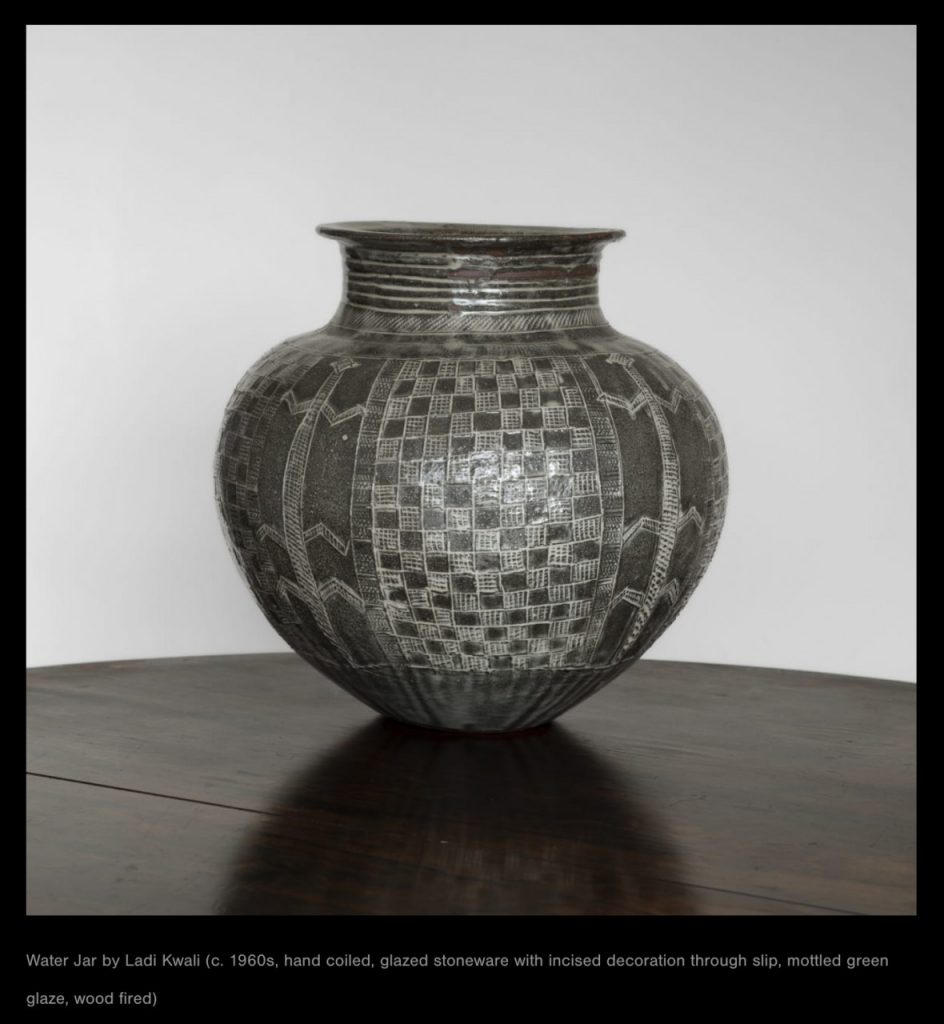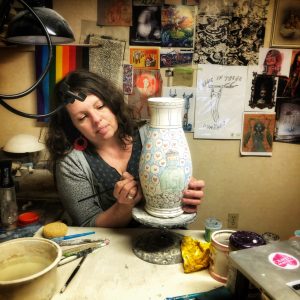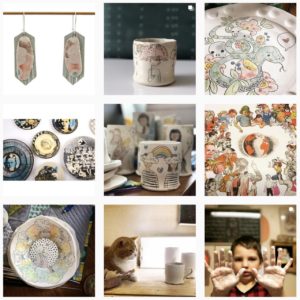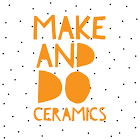The following is the press release for the exhibition from their website:
“PIONEERING WOMEN 14 February – 27 March 2021
This February, Oxford Ceramics Gallery will present ‘PIONEERING WOMEN’, an exhibition featuring some 40 works by 10 pioneering female artists. The exhibition will celebrate the significant contribution this group of artists has made to the development of contemporary ceramics, with a focus on the ceramic vessel form.
From trailblazing figures such as Lucie Rie and Ladi Kwali to Bodil Manz, Magdalene Odundo and Jennifer Lee, the exhibition will reflect a broad interpretation of formal ceramic traditions. The vessels on display will range from Japanese clay work and the domestic pottery forms of Denmark, Korea and Nigeria, to works influenced by European movements such as Bauhaus and Postmodernism.
The exhibitors span three generations, from Viennese-born Lucie Rie (1902–1995) to Japanese-born Akiko Hirai (b. 1970). Rie, with her refined thrown and glazed domestic vessel forms, brought the unmistakable aesthetic of European modernism to the UK when she fled Vienna in 1938. Hirai, who is now based in London, re-interprets the traditional Korean Moon Jar form (originally an everyday storage jar) through combined coiling and throwing. This technique offers a contemporary take on the Korean tradition which is influential within the modernist school of studio ceramics. Another development of European modernist form can be seen in the work of Danish designer Bodil Manz (b. 1943). Manz’s precisely constructed cylinder vessels make use of industrial ceramic techniques such as slipcasting, mouldmaking and transfer printing to create simple translucent forms.
The hand-built hollow clay forms of Dutch artist Deirdre McLoughlin (b. 1949) reflect her time spent working with the experimental Sodeisha group of Japanese artists near Kyoto, in the early 1980s. Similarly, the winner of the 2017 LOEWE Foundation Craft Prize Jennifer Lee (b. 1956) studied Japanese traditions and techniques during residencies in Shigaraki, a period which deeply influenced her subtle earth-toned works. Japanese influences can also be seen in works by Danish artist, Inger Rokkjaer (1934– 2008) whose vessels meld a subtle use of raku with homage to the earthenware domestic pottery of her native Jutland, Denmark.
The unusual aesthetic of British artist Carol McNicoll (b. 1943), who originally trained in fine art, makes inventive use of industrial ceramic techniques. Combining her artistic knowledge of collage and textiles with slipcasting she creates patterned surfaces and
coloured, constructed, domestic forms intended for everyday use. Together with fellow British artist Alison Britton (b. 1948), McNicoll came to prominence as part of a group of female RCA graduates in 1970s London. Also known as ‘The London Ladies’, they were commonly identified with Postmodernism due to their free juxtaposition of formal traditions. Britton’s square, asymmetric vessels embody her characteristic fusion of painting and sculpture. These hand-built, large-scale forms explicitly reject the dominant, circular form beloved of modernist potters such as Rie.
Works on show by Nigerian artist, Ladi Kwali (1925–1984) combine throwing and hand- building, revealing her immersion in both African and European traditions. The latter was honed at the Abuja Pottery School, Nigeria, under English studio potter Michael Cardew in the 1950s. In 1974, Cardew introduced Kwali to Magdalene Odundo (b. 1950). Working with Kwali, Odundo studied the traditionally female technique of making utilitarian pots in Africa, as well as practical techniques like hand-building. Odundo used her experience with Kwali in Nigeria to develop her independent approach to ceramics, originally fostered as a student at Farnham School of Art. Her powerful, red and black clay vessel forms reveal keen understanding of the hybrid nature of ceramic art forms.
ENDS
Notes to Editors
Image credit: Lucie Rie, Porcelain conical bowl with manganese glaze and sgraffito, 10 x 20 cm. Image: Michael Harvey.
For all PRESS enquiries please contact Rees & Co: Yasmin Hyder | [email protected]
Carrie Rees | [email protected]
Oxford Ceramics Gallery, 29 Walton St, Oxford, OX2 6AA
T +44 (0)18 6551 2320 | E [email protected] | W oxfordceramics.com | I @oxfordceramicsgallery
Exhibition dates: 14 February – 27 March 2021
Open Wednesday–Saturday, 11am–4pm, by appointment
Please note: due to new Covid-19 guidelines Oxford Ceramics Gallery will remain temporarily closed until further notice.
About the Curators
James Fordham, Founding Director of Oxford Ceramics Gallery, is an acknowledged expert in the field of studio ceramics, and regular advisor to both museums and private collectors in the field. Through his work at Oxford Ceramics Gallery he is developing a programme of well-researched 20th century and contemporary ceramic exhibitions which make an active contribution to the development of scholarship, knowledge and understanding in the field. In 2016 he invited experienced independent curator Amanda Game to work with him and the gallery on a regular basis to develop aspects of this programme. Recent collaborations have included ‘Blue and White’, June 2019, that explored contemporary perspectives on this ancient ceramic tradition and ‘Oxford Pioneers’, November 2018, which celebrated the life and work of potter turned gallerist Joan Crossley-Holland.
Amanda Game has enjoyed a 40-year career as an exhibition maker, curator and events producer with a specialist interest in supporting contemporary makers: their thinking and their objects. Following a 21 year career in commercial practice at the Scottish Gallery, Edinburgh (1986 – 2007), Game established an independent studio to foster imaginative exhibition making in both public and private galleries working with clients which include Dovecot Tapestry Studios, Edinburgh; V & A Museum, London; Goldsmiths Centre, London; Jerwood Charitable Foundation; National Museums, Edinburgh; Fitzwilliam Museum, Cambridge; Two Temple Place, London.
About Oxford Ceramics Gallery
Oxford Ceramics Gallery was set up online in 2006 and opened its doors in Oxford, in 2011. The gallery has a genuine passion for ceramics underpinned by extensive knowledge gained over 25 years, enabling it to offer world class ceramics in an intimate and well-designed viewing environment, placing ceramics within art history.”








